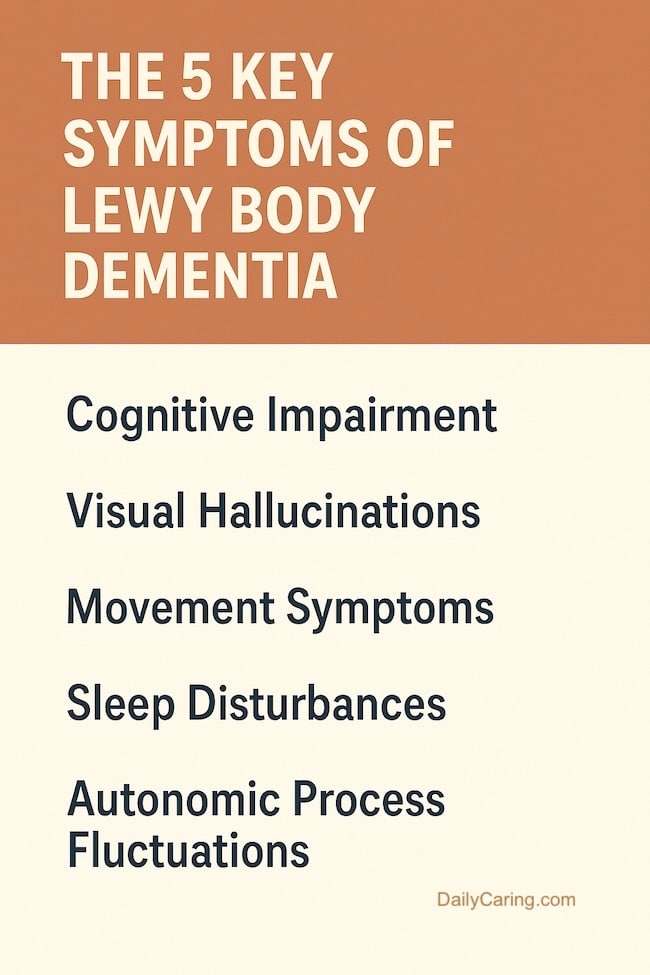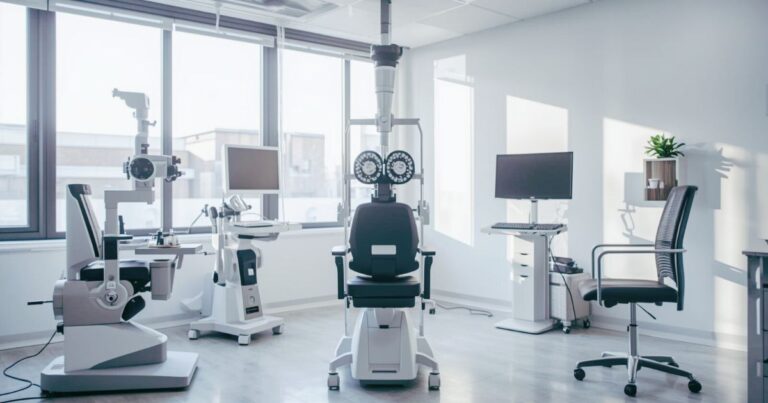Lewy body dementia (LBD) is the second most common type of progressive dementia, yet it remains widely misunderstood and frequently misdiagnosed. Unlike Alzheimer’s disease, LBD causes unique and often fluctuating symptoms that can confuse families and even healthcare providers.
Recognizing the signs early is crucial, as this condition requires specialized care approaches. In this article, we break down the five hallmark symptoms of Lewy body dementia, ranging from visual hallucinations to movement disorders, and explain why they differ from those of other forms of cognitive decline.

Whether you’re concerned about a loved one or seeking clarity after a diagnosis, understanding these key indicators can lead to more effective support and timely intervention.
1.4 million Americans live with Lewy body dementia, but it takes an average of 3 doctors and 18 months to get an accurate diagnosis – Lewy Body Dementia Association
Get the Facts About Lewy Body Dementia
Lewy body dementia is a progressive, degenerative brain disease. It’s the third most common form of dementia, after Alzheimer's disease and vascular dementia.
It can be a confusing type of dementia because there are some similar symptoms to those found in Alzheimer’s, but loss of short-term memory isn’t common.
It can also be challenging to diagnose because some of the symptoms have a significant overlap with Parkinson’s disease.
We explain Lewy body dementia, how it differs from Alzheimer’s and Parkinson’s, and the five main symptoms of the disease.
What is Lewy Body Dementia?
It’s called Lewy body dementia because the disease is associated with the abnormal buildup of proteins in the brain into masses known as Lewy bodies.
When they accumulate, they can impair brain functions, including memory, motor skills, cognitive abilities, mood, and behavior.
There are two forms of Lewy body dementia: dementia with Lewy bodies and Parkinson’s disease dementia.
In dementia with Lewy bodies, the first symptoms are like the memory disorders seen in Alzheimer's disease.
Later, the person will develop movement problems similar to motor symptoms of Parkinson's disease and other Lewy body symptoms.
In Parkinson’s disease dementia, the person first develops a movement disorder that looks like Parkinson’s, but later develops dementia symptoms. Their physical symptoms may also be milder than in typical Parkinson’s.
How Lewy Body Dementia Differs From Parkinson’s or Alzheimer’s
Lewy body dementia is similar to and often confused with Parkinson’s or Alzheimer’s. Although they are different diseases, there are notable differences in their symptoms and the timing of their onset.
Lewy body disease may not cause the short-term memory loss of Alzheimer’s. However, problems with thinking, alertness, and attention will come and go in Lewy body disease.
A sign that your older adult could have Lewy body rather than another dementia is if they have symptoms of cognitive decline without the typical short-term memory problems.
For example, Lewy body often causes hallucinations, especially in the first few years. With Alzheimer’s, hallucinations usually don’t show up until the later stages.
People with Lewy bodies also have REM sleep behavior disorder, which causes them to act out their dreams and make violent movements while asleep. This is not common in Alzheimer’s.
Both Lewy body and Parkinson’s cause movement problems, but Parkinson’s doesn’t cause problems with thinking and memory until the later stages of the disease – and sometimes it doesn’t happen at all.
VIDEO: Lewy Body Dementia – 5 Key Symptoms
When Do Lewy Body Dementia Symptoms Occur?
With Lewy body dementia, cognitive problems typically start much sooner. That’s why doctors and researchers usually use the “1-year rule” to aid in making a diagnosis.
If cognitive symptoms appear at the same time as or at least a year before movement problems, the diagnosis is likely dementia with Lewy bodies.
But if cognitive problems develop more than a year after the onset of movement problems, the likely diagnosis is Parkinson's disease dementia.
Because of these differences, the treatments and medications used for Lewy body dementia are not always the same as the ones used to treat Parkinson’s or Alzheimer’s.

The 5 Key Symptoms of Lewy Body Dementia
Five symptom groups are commonly associated with Lewy body dementia. They will worsen over time, typically over several years.
1. Cognitive Impairment
- Extreme swings between being alert and being confused or drowsy – episodes are unpredictable and could last a few seconds to several hours
- Reduced attention span
- Difficulty with planning, decision-making, and organization
- Problems with visual perception (judging and navigating distances) – often causing falls or getting lost in familiar places
- Increased trouble with the tasks of daily living
2. Visual Hallucinations
Another common symptom is repeated visual hallucinations or delusions – like seeing shapes, colors, people, or animals that aren't there. They may also have conversations with people who have passed away.
3. Movement Symptoms
- Slow movement
- Shuffling walk or abnormal gait
- Stiff limbs
- Tremors
- Lack of facial expression
4. Sleep Disturbances
- Insomnia
- Daytime sleepiness
- REM sleep behavior disorder – acting out dreams while asleep: physically moving, sleep talking, screaming, hitting, or even getting up and engaging in daytime activities
5. Autonomic Process Fluctuations
Lewy bodies may also cause problems with automatic bodily functions, including blood pressure, body temperature, urination, constipation, and swallowing.
Lewy Body Dementia and Life Expectancy
The average person usually lives 5 to 7 years after a Lewy Body dementia diagnosis. But some people with LBD live up to 20 years after their diagnosis.
Unlike other dementias, Lewy body doesn’t follow a pattern of stages. The disease will continue to get progressively worse, but the rate of decline is different in each person.
Final Thoughts About Lewy Body Dementia
Recognizing these five core symptoms is the first crucial step toward an accurate diagnosis and a compassionate care plan for your loved one. While the road ahead with LBD is undeniably challenging, understanding what you're facing can replace fear with clarity and empower you to become a strong, informed advocate.
Remember, you are not alone in this journey. Connecting with support groups and healthcare providers who specialize in LBD can provide invaluable guidance and community. Trust your instincts—if something feels “off,” you are your loved one's most important voice.
This knowledge is your compass, helping you navigate the path forward with greater confidence and compassion.
Note: If you've had experience with Lewy Body Dementia, we invite you to share your story in the comments.
Recommended for you:
- How to Understand and Manage Dementia Behaviors: A Comprehensive Guide
- Medications Worsen Dementia and Increase Dementia Risk: Anticholinergics
- 8 Forms of Dementia You Might Not Know About
About the Author

Chris is a seasoned healthcare executive and entrepreneur from the Pacific Northwest. He strongly advocates for older adults and the caregivers who serve them. Chris has personal experience caring for his father, who had dementia. Chris is an avid outdoorsman; if he's not in his office, he can usually be found on a golf course or in a garden out west somewhere.














my mother is wetting her fingers in her mouth and rubbing her eyes they are totally red I put gloves on her but can’t keep them on it is a real battle any suggestions or medicines besides olopatadine
There are a variety of things that could trigger this type of behavior. The most common would be physical discomfort or anxiety and agitation.
First, rule out any physical discomfort. Perhaps her eyes are irritated or somehow are bothering her. Or maybe her vision could be changing, which could be bothering her.
These articles help explain a variety of behaviors:
– Understanding and Managing Dementia Behaviors: A Comprehensive Guide https://dailycaring.com/understanding-and-managing-dementia-behaviors-a-comprehensive-guide/
– Untreated Pain in Dementia: Signs, Causes, and Treatments https://dailycaring.com/untreated-pain-in-dementia-signs-causes-and-treatments/
– Dementia and Eyesight: 3 Common Changes and Behaviors https://dailycaring.com/dementia-and-eyesight-an-expert-explains-common-changes-and-behaviors-video/
Next, try pleasant, soothing distractions to occupy her hands in safe ways. This article might be helpful – 6 Ways to Help Seniors with Alzheimer’s Keep Hands Busy https://dailycaring.com/6-ways-to-help-seniors-with-alzheimers-keep-hands-busy/
Keeping her occupied with other activities may also help distract her. Here are some suggestions:
– 10 Fun, No-Fail Activities for People with Dementia https://dailycaring.com/activities-for-people-with-dementia-10-fun-no-fail-ideas/
– Alzheimer’s and Dementia Activities https://dailycaring.com/tag/alzheimers-dementia-activities/
I really wish you wouldn’t add life expectancy in your articles. It is very painful to have it pop up unexpectantly. I am a wife who’s much younger than my beloved husband who has just been diagnosed. Watching the calendar has taken away any sense of hopefulness I had. I am already suffering from major depression. Also, every other reputable article I have read says Dementia with Lewy Bodies is the second most common dementia. Suicidial ideation in the south.
I’m very sorry 🙁 It is indeed sad to think about the potential end of life for the people we love. But sometimes knowing what to expect can help us to maximize the time we have left and enjoy it as much as possible.
If you are feeling suicidal, I urge you to call the National Suicide Prevention Hotline at 1-800-273-8255 — https://suicidepreventionlifeline.org/
I hope that you’re able to speak with someone who can help ease your depression. Caregiving is a stressful and challenging role, which can often lead to depression. A therapist can often teach helpful ways to cope with the stress and anticipatory grief or identify when medication may also be helpful. We have some recommendations on how to find low-cost therapy options — https://dailycaring.com/low-cost-therapy-options-help-caregivers-cope/
Support groups are another wonderful way to get support from people who understand what you’re going through and find ways to cope with what’s happening. Both in-person and online support groups are wonderful. Here are some recommendations:
— https://dailycaring.com/8-benefits-of-caregiver-support-groups/
— https://dailycaring.com/11-caregiver-support-groups-on-facebook-youll-want-to-join/
You may also want to contact the Alzheimer’s Association and speak with one of their wonderful family specialists. They may be able to recommend helpful local resources. Call them 24/7 at 1-800-272-3900.
In terms of how common Lewy Body dementia is, we look to experts like Alzheimer’s Association and the U.S. National Institute on Aging who say that it’s the third most common form after Alzheimer’s and vascular dementia. Regardless, it’s a serious condition that affects far too many people 🙁
Hang in there! There will be a cure for this before you know it. Main thing is healthy diet and exercise for any illness.
I’m no professional. I’m just a person wishing you well. 😢
My mother has Alzheimer’s and uf something happens, she will say someone did what ever happen. She will say someone has been mean to her, and she wants to stack paper towels up. And she has to have at least 5 rools of toilet paper in the bathroom. But she accuses other people of doing things. What makes her do this.
I’m so sorry Barbara, it sounds like your mother has symptoms that are common in Alzheimer’s. Alzheimer’s disease is destroying her brain and that causes behavior that doesn’t make sense to us. The best thing to do is to go along with her as much as possible, even if it’s something untrue. This is her reality and there’s no way that someone can force her to rejoin our reality — the damage in her brain won’t allow that to happen.
We’ve got some articles that will help you understand these symptoms and manage or cope with them:
— Why and how to go along with what she says, even if it’s not true https://dailycaring.com/q-a-should-you-correct-someone-with-alzheimers/
— Why she might make false accusations https://dailycaring.com/8-ways-to-deal-with-false-dementia-accusations/
— She probably finds no-fail activities soothing or that they give her a sense of purpose and accomplishment https://dailycaring.com/12-engaging-activities-for-seniors-with-dementia-reduce-agitation-boost-mood/
— The stages of dementia (which includes Alzheimer’s) https://dailycaring.com/3-stages-of-dementia-what-to-expect/
We’ve also got an extensive section with more articles about Alzheimer’s/dementia behaviors that might be helpful as new symptoms come up:
— https://dailycaring.com/category/health-conditions/alzheimers-dementia/